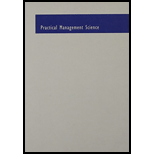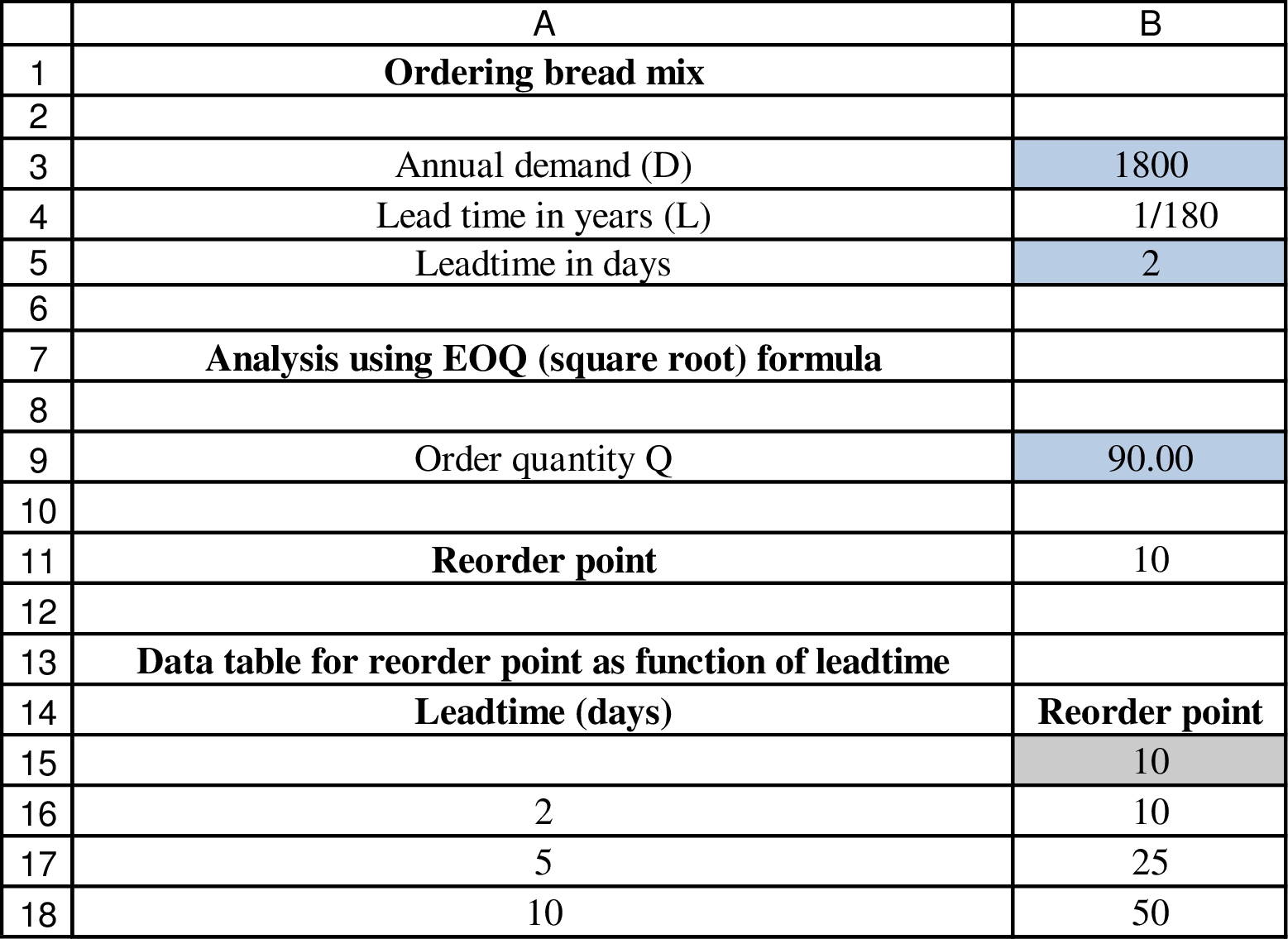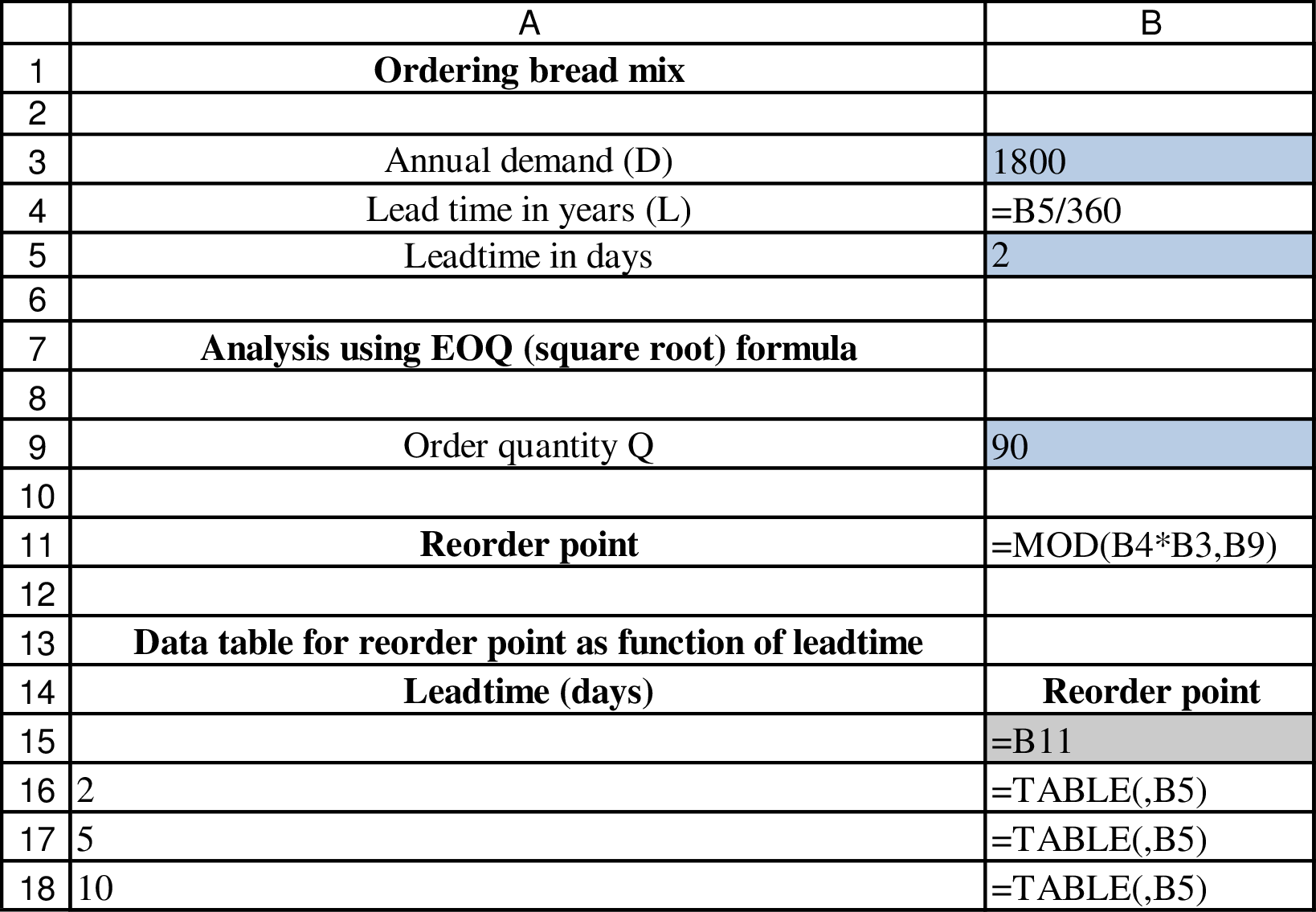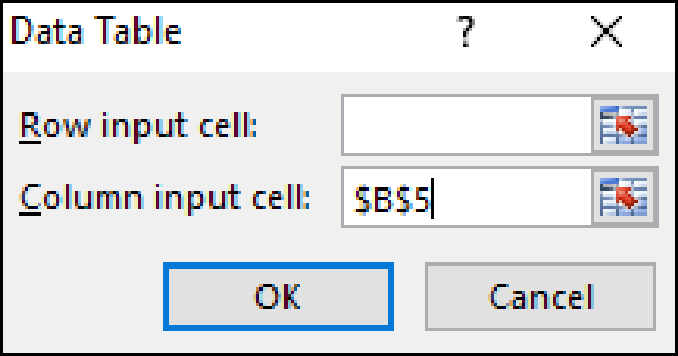
Practical Management Science, Loose-leaf Version
5th Edition
ISBN: 9781305631540
Author: WINSTON, Wayne L.; Albright, S. Christian
Publisher: Cengage Learning
expand_more
expand_more
format_list_bulleted
Concept explainers
Question
Chapter 12, Problem 27P
Summary Introduction
To identify: The reorder point at which the bakery must place the orders.
Inventory and supply chain models:
The functions of inventory and supply chain are one of the most important business decision areas for an organization. The first important aspect of these concepts is to have adequate inventory on hand. The second important aspect is to carry a little amount of inventory as possible.
Expert Solution & Answer
Explanation of Solution
Model:

Formula:

Data table to calculate the reorder point for different lead times:
Cells A15 to B18 is selected and the input is given as shown below:

Output:

Want to see more full solutions like this?
Subscribe now to access step-by-step solutions to millions of textbook problems written by subject matter experts!
Students have asked these similar questions
A logistics company applies the EOQ model to manage its inventory of spare parts
used for maintenance work for their trucks. Daily demand is normally distributed.
The average daily demand is 10 units, with a standard deviation of 5 units. The EOQ
is found to be 400 units and used as the order size for all orders. Order lead time is 4
days.
Currently, the firm has just received an order. In how many days do they need to
place the next order?
4 days
36 days
40 days
None of the above. Demand is random, so the time until they reach the ROP
again is also random
A logistics company applies the EOQ model to manage its inventory of spare parts used for maintenance work for their trucks. Daily demand is normally distributed. The average daily demand is 10 units, with a standard deviation of 5 units. The EOQ is found to be 400 units and used as the order size for all orders. Order lead time is 4 days.
Currently, the firm has just received an order. In how many days do they need to place the next order?
A manufacturer has a production facility that requires 15,604 units of component JY21 per year.
Following a long-term contract, the manufacturer purchases component JY21 from a supplier with a
lead time of 7 days. The unit purchase cost is $25.6 per unit. The cost to place and process an order
from the supplier is $121 per order. The unit inventory carrying cost per year is 10.5 percent of the
unit purchase cost. The manufacturer operates 250 days a year. Assume EOQ model is appropriate. If
the manufacturer uses a constant order quantity of 2,640 units per order, what is the annual holding
cost?
Use at least 4 decimal places.
Chapter 12 Solutions
Practical Management Science, Loose-leaf Version
Ch. 12.4 - Prob. 1PCh. 12.4 - Prob. 2PCh. 12.4 - Prob. 3PCh. 12.4 - Prob. 4PCh. 12.4 - Prob. 5PCh. 12.4 - Prob. 6PCh. 12.4 - Prob. 7PCh. 12.4 - Prob. 8PCh. 12.4 - Prob. 9PCh. 12.4 - Prob. 10P
Ch. 12.4 - Prob. 11PCh. 12.5 - Prob. 12PCh. 12.5 - Prob. 13PCh. 12.5 - Prob. 14PCh. 12.5 - Prob. 15PCh. 12.5 - Prob. 16PCh. 12.5 - Prob. 17PCh. 12.5 - Prob. 18PCh. 12.5 - Prob. 19PCh. 12.5 - Prob. 20PCh. 12.5 - Prob. 21PCh. 12 - Prob. 27PCh. 12 - Prob. 28PCh. 12 - Prob. 29PCh. 12 - Prob. 30PCh. 12 - Prob. 31PCh. 12 - Prob. 32PCh. 12 - Prob. 33PCh. 12 - Prob. 34PCh. 12 - Prob. 35PCh. 12 - Prob. 36PCh. 12 - Prob. 38PCh. 12 - Prob. 39PCh. 12 - Prob. 40PCh. 12 - Prob. 42PCh. 12 - Prob. 43PCh. 12 - Prob. 44PCh. 12 - Prob. 45PCh. 12 - Prob. 46PCh. 12 - Prob. 47PCh. 12 - Prob. 48PCh. 12 - Prob. 49PCh. 12 - Prob. 53PCh. 12 - Prob. 54PCh. 12 - In terms of K, D, and h, what is the average...Ch. 12 - Prob. 56PCh. 12 - Prob. 57PCh. 12 - Prob. 58PCh. 12 - Prob. 59PCh. 12 - Prob. 60PCh. 12 - Prob. 61PCh. 12 - Prob. 62PCh. 12 - Prob. 63PCh. 12 - Prob. 64PCh. 12 - Prob. 65PCh. 12 - Prob. 66PCh. 12 - Prob. 67PCh. 12 - Prob. 68PCh. 12 - Prob. 69PCh. 12 - Prob. 70PCh. 12 - Prob. 71PCh. 12 - Prob. 1.1CCh. 12 - Prob. 1.2CCh. 12 - Prob. 1.3C
Knowledge Booster
Learn more about
Need a deep-dive on the concept behind this application? Look no further. Learn more about this topic, operations-management and related others by exploring similar questions and additional content below.Similar questions
- Assume the demand for a companys drug Wozac during the current year is 50,000, and assume demand will grow at 5% a year. If the company builds a plant that can produce x units of Wozac per year, it will cost 16x. Each unit of Wozac is sold for 3. Each unit of Wozac produced incurs a variable production cost of 0.20. It costs 0.40 per year to operate a unit of capacity. Determine how large a Wozac plant the company should build to maximize its expected profit over the next 10 years.arrow_forwardDaily demand of a chemical at an oil refinery is normally distributed with a mean of 60 litres and a standard deviation of 7. The supplier reliably delivers the chemical by maintaining a constant lead time of 1 week. There are no delivery charges from the supplier. Sales occur throughout the year. An order placement requires one hour of an administrative employee who is paid $20 per hour. Receiving and storing a chemical shipment requires two workers to work for half an hour. Workers are paid $12 per hour each. Chemical’s purchase price is $500 per litre. Annual cost of capital is 5%. Other holding costs are estimated to be $0.5 per litre. Find the order quantity and the reorder point to satisfy a 95% service level during the lead time. (Round answers to 2 decimal places.)arrow_forwardAn automotive warehouse stocks a variety of parts that are sold at neighborhoodstores. One particular part, a popular brand of oil filter, is purchased by thewarehouse for $1.50 each. It is estimated that the cost of order processing andreceipt is $100 per order. The company uses an inventory carrying charge based on warehouse for $1.50 each. It is estimated that the cost of order processing andreceipt is $100 per order. The company uses an inventory carrying charge based ona 28 percent annual interest rate.The monthly demand for the filter follows a normal distribution with mean280 and standard deviation 77. Order lead time is assumed to be five months.Assume that if a filter is demanded when the warehouse is out of stock, then thedemand is back-ordered, and the cost assessed for each back-ordered demand is$12.80. Determine the following quantities:a. The optimal values of the order quantity and the reorder level.b. The average annual cost of holding, setup, and stock-out associated…arrow_forward
- E - Max uses the basic EOQ model to determine the order quantity . They used to buy electronics from a Korean supplier in Dubai with a lead - time of 5 days . Recently , the supplier has decided to close the warehouse in Dubai and deliver all items from Korea directly to customers in Oman with a lead time of 10 days . Under this situation , the economic order quantity will (Q^ * ) 1)double 2)None of these 3)increase , but not double 4)decrease by a factor of two 5)do remain the samearrow_forwardJoe is selling Christmas trees to pay his college tuition.He purchases trees for $10 each and sells them for $25each. The number of trees he can sell is normally distributedwith a mean of 100 and standard deviation of 30. How manytrees should Joe purchase?arrow_forwardA retailer has 7 stores in different cities in northern Ontario. The weekly demand for each store follows the normal distribution with a mean value of 60 and a standard deviation of 10. The retailer is planning to use a single centralized store in northern Ontario and they think the demand in the single store will be equal to the sum of the demand in all 7 cities. It takes 3 weeks for the supplier to send the products to the retailer. Calculate the safety stock for the centralized and decentralized cases if the correlation of demands between different cities is 0.3. Assume the planned customer service level is 98%. Please post answer in excel showing formula and answerarrow_forward
- Your firm uses a periodic review system for all SKUs classified, using ABC analysis, as B or C items. Further, it uses a continuous review system for all SKUs classified as A items. The demand for a specific SKU, currently classified as an A item, has been dropping. You have been asked to evaluate the impact of moving the item from continuous review to periodic review. Assume your firm operates 52 weeks per year; the item’s current characteristics are:Demand 1D2 = 15,080 units/yearOrdering cost 1S2 = $125.00/orderHolding cost 1H2 = $3.00/unit/yearLead time 1L2 = 5 weeksCycle@service level = 95 percentDemand is normally distributed, with a standard deviation of weekly demand of 64 units.a. Calculate the item’s EOQ.b. Use the EOQ to define the parameters of an appropriate continuous review and periodic review system for this item.c. Which system requires more safety stock and by how much?arrow_forwardThe GIIC -Company must determine a policy for ordering coal to operate 15 smelters. Each smelter requires exactly 5 tons of coal per day to operate, and the firm operates 360 days per year. The purchasing manager has negotiated a contract to obtain the coal for 5 BD per ton for the coming year. The purchasing manager has determined that the ordering cost is 40 BD per order, and the cost of holding coal is 20% per ton of its value. i. Determine the optimal quantity of coal to receive in each order. ii. Determine the total inventory-related costs associated with the optimal ordering policy (do not include the cost ii. If five days' lead time is required to receive an order of coal, how much coal should be on hand when an iv. Optimal quantity 1837.11 Tons, Total cost 1837.11 BD, Inventory during LT 275 Tons of the coal). order is placed? i. Optimal quantity 1469.694 Tons, Total cost 1469.694 BD, Inventory during LT 375 Tons ii. Optimal quantity 734.85 Tons, Total cost 1649.694 BD,…arrow_forwardBigby Riggs sells high-end art frames that are ordered every Thursday to prepare for next week's demand. The most popular frame style is sold at $50 per unit and it costs Bigby $35 per piece. If too many art frames are ordered, Bigby incurs an inventory carrying cost of $2 per frame. If Bigby runs out of stock for the week, he forgoes the profits from missed sales. Bigby has the option to order 100, 150, or 200 art frames to meet next week's demand which can be either 100, 150, or 200 frames. Based on historical demand, Bigby has determined the following probability information: P(100) = 0.4, P(150) = 0.3, P(200) = 0.3 What is the Expected Monetary Value of your best alternative?arrow_forward
- Bigby Riggs sells high-end art frames that are ordered every Thursday to prepare for next week's demand. The most popular frame style is sold at $50 per unit and it costs Bigby $35 per piece. If too many art frames are ordered, Bigby incurs an inventory carrying cost of $2 per frame. If Bigby runs out of stock for the week, he forgoes the profits from missed sales. Bigby has the option to order 100, 150, or 200 art frames to meet next week's demand which can be either 100, 150, or 200 frames. Based on historical demand, Bigby has determined the following probability information: P(100) = 0.4, P(150) = 0.3, P(200) = 0.3 The expected value of perfect information (EVPI) is $_________.arrow_forwardAboloway Company stocks a part that has a daily demand represented by the empirical distribution (shown in the table below). When restocking this part, the average lead time from the supplier is 3 days with a standard deviation of 0.5 days. The plant manager wants to determine how much safety stock to maintain for this part to ensure that stock-outs will not be incurred in more than 5.5% of the order cycles. Daily demand (d) in units Frequency 5 10 10 35 15 65 20 32 25 8 Total Observations = 150 3a. Find the mean and standard deviation for demand. 3b. Based on the information in problems 3 and 3a, what is the mean and standard deviation of demand during the lead time? 3c. Based on the information in problems 3, 3a, and 3b, how much safety stock should the plant manager maintain to ensure that stock-out will not be incurred in more than 5.5% of the order cycles?arrow_forwardThe Great North Supermarket stocks Munchkin Cookies. Demand for Munchkins is 5000 boxes per year (365 days). It costs the store $60 per order of Munchkins, and it costs $0.70 per box per year to keep the cookies in stock. Once an order for Munchkins is placed, it takes four days to reveive the order from a food distributor. Determine the following: a. Optimal order size (EOQ) b.Minimum total annual inventoy cost c. Reorder point (R) d. Number of orders e. Time between ordersarrow_forward
arrow_back_ios
SEE MORE QUESTIONS
arrow_forward_ios
Recommended textbooks for you
 Practical Management ScienceOperations ManagementISBN:9781337406659Author:WINSTON, Wayne L.Publisher:Cengage,
Practical Management ScienceOperations ManagementISBN:9781337406659Author:WINSTON, Wayne L.Publisher:Cengage,

Practical Management Science
Operations Management
ISBN:9781337406659
Author:WINSTON, Wayne L.
Publisher:Cengage,
Single Exponential Smoothing & Weighted Moving Average Time Series Forecasting; Author: Matt Macarty;https://www.youtube.com/watch?v=IjETktmL4Kg;License: Standard YouTube License, CC-BY
Introduction to Forecasting - with Examples; Author: Dr. Bharatendra Rai;https://www.youtube.com/watch?v=98K7AG32qv8;License: Standard Youtube License